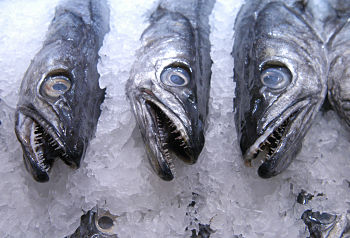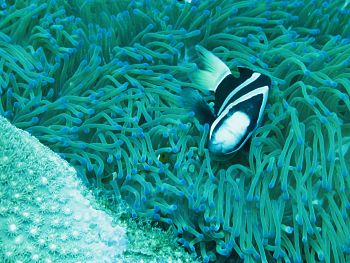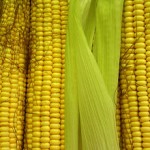Ten Reasons Seafood Is Not Safe or Appetizing
Government, media, and even health professionals flood you with advice to load up your diet with fish and fish oil. The alleged health benefits of eating fish center on a two nutrients: omega-3 fatty acids and protein.
Don’t be fooled by industry and government hype. Plants are the base of the food chain on planet earth. Plants are nutrient factories, while animals are nutrient consumers. Fish are animals, and as such get all their nutrients from plants or from smaller fish who ate plants.
On a whole foods, plant-based diet, you get all the nutrients in fish, plus many more. Your food is beautiful and appealing. All you give up on a plant-based diet are the dangerous drawbacks of fish.
Here are ten reasons to throw fish out of your diet and back into the water where they belong.
One. While fish does contain long-chain omega-3 fatty acids, these animals get this fat by eating marine algae that made the omega-3s in the first place. No animal has the ability to manufacture omega-3s.
Unhealthy fats come packaged with fishy omega-3s. For example, according to a US Department of Agriculture database, 3
ounces of cooked wild salmon has about a gram of dangerous saturated fat – just about exactly that same amount it has of omega-3s. Plus this salmon has 47 milligrams of cholesterol, a substance your body makes naturally and that contributes to clogged arteries when you eat it.
You can get all the omega-3s you need from plants, which form this beneficial fat in the first place.
Two. A much-touted “benefit” of fish is its high concentration of animal protein. Few know that animal protein can directly raise the amount of cholesterol in your blood, in addition to the role that animal fat also plays in this process. Excessive
dietary protein can damage your kidneys and liver and may spark the chronic inflammation that underlies most chronic illness.
Proteins are the basis of all life, both plants and animals. These proteins are linked assemblies of 20 amino acids – the same aminos form both plant and animal proteins. Only plants can make essential amino acids, the ones you need from diet. Get your proteins directly from the plant factory, not the animal middleman.
Three. Fish concentrate persistent organic pollutants and other manmade contaminants. Persistent organic pollutants (POPs) are highly dangerous chemicals that include PCBs, DDT, dioxins, and PBDEs (flame retardants), among many others. Cancer, nervous system damage, behavior problems, Parkinson’s disease, reproductive disorders, immune system disruption and autoimmune disorders, diabetes, and allergies can all result from exposure to POPs.
Animal foods are most likely the source of 89% to 99% of POPs in your body. A study of U.S. supermarkets found the
product most contaminated with PBDE, a class of POPs used as flame retardants, was fish.
If you decide to go for distilled or “purified” fish oil in hopes of avoiding the POPs in whole fish, you are out of luck. Laboratory studies show that even distilled, highly processed fish oil capsules still contain these dangerous pollutants.
Fish farm owners may deliberately contaminate the fish they raise with drugs and other chemicals that are banned for human consumption. The goal is to keep these animals alive in the filthy, crowded conditions of fish farming. Imported seafood, which is most often tainted with these harmful contaminants (some carcinogenic) accounts for 80% of the fish Americans eat. The government inspects only about 1% of the fish that enter the US.
Fish is not accurately labeled and it is practically impossible to determine where it came from or how it was raised. So if you eat much fish, the likelihood that your meals are contain toxic contaminants is overwhelming.
Four. Fish is the leading dietary source of mercury, a potent neurotoxin. While a developing fetus is most susceptible to this poison, adults can be harmed as well. There is no safe level of mercury in your food. Don’t be fooled by “low mercury” fish. Virtually all fish are contaminated with this toxic metal, which also increases the risk of heart attack.
Five. Fish can also be contaminated by microbes that cause food poisoning. This is especially true for imported seafood and fish that have not been properly refrigerated somewhere between their death and your dinner plate. Possible pathogens in fish include E. coli, salmonella, staph, and botulism.
Six. When excess fertilizer and nitrogen (often from factory farms) floods fresh water, cyanobactera thrive. These microbes produce a number of toxins. Microcystin, one of these toxins, harms the liver. In addition, it may be a tumor promoter and have an effect similar to estrogen on the body, disrupting reproduction. Microcystin accumulates in fish. If you eat enough
of it, damage to your liver may be severe and irreversible. There is no easy therapy.
Seven. An adequate amount of omega-3 fatty acids is essential. An excessive amount, however, as may result if you consume fish oil or a lot of fish, has perilous consequences. An unnatural amount of these fatty acids can lead to increased bleeding time, interfere with wound healing, raise LDL cholesterol, and suppress the immune system
Eight. Fish oil tastes bad and leaves an unpleasant aftertaste. It can cause indigestion and burping. Fish oil is just plain gross. It’s more susceptible than vegetable oil is to becoming rancid, and rancid oil can damage your liver. When fish start to decompose, unscrupulous companies may cover up the odor with chemicals – for example, a mixture of chlorine, trisodium
phosphate, lemon juice, and copper sulfate.
Nine. Speaking of gross, parasitic worms and/or their larvae are common in fish, including the fish muscle that people eat. For example, one study found that every single one of 50 wild sockeye salmon caught during their spawning migration contained the larvae of the parasitic worm Anisakis simplex. Eight-seven percent of the larvae were in the salmon’s muscle – the part of the animal that people eat. A National Institutes of Health fact sheet on the fish tapeworm, another parasite, warns that these worms can infect humans who eat raw or undercooked freshwater fish. The worm will grow in your intestinal tract, possibly becoming 30 feet long and causing anemia and intestinal blockage.
To avoid humans becoming hosts for fish parasites, the U.S. government mandates that all seafood that is to be served raw be frozen at very low temperatures for extended periods of time. Note these are temperatures often not achieved by home
freezers. However, there is no guarantee that the business which supplied the fish you are eating actually complied to the extent the larvae were frozen to death.
Even if all the fish larvae you eat are dead – killed either by cooking or freezing – you can have an allergic reaction to them. Even if you have no reaction and are not infested, how appetizing is it to eat worm larvae? Would you order worm larvae in
a restaurant? When you think about it, wouldn’t you rather just have a nice black bean burrito or hummus sandwich?
Ten. Finally, 90% of the large fish in the ocean have already been killed and the oceans are being overfished at a totally unsustainable rate. A recent panel of 27 top scientists concludes the oceans are on the brink of catastrophic extinction. Does that one fish you plan to eat make a difference? Yes, it does. Every time you eat, you vote for either survival or extinction. Which will it be?
You may be thoroughly confused by now, thinking of all the studies you’ve heard about that say fish is healthy. Well, those are the industry and government hyped studies. Actually, a mountain of studies show fish does NOT have positive effect on health, but you never hear about those.
For example, a study published in American Journal of Clinical Nutrition in 2009 followed 195,204 adults for almost 3 million person-years. The researchers found that eating a lot of fish increased the risk of developing type 2 diabetes. Another study, published in 2011 in American Journal of Epidemiology, found that men with higher levels of long-chain omega-3 fatty acids (which often indicates eating more fish or fish oil) were more likely to develop high-grade prostate cancer.
What’s more, the studies that do show any benefit for fish and fish oil are comparing people who eat fish (people who are generally health conscious and may pair their fish with spinach and baked sweet potatoes) with people who eat a standard diet of fast food burgers, chips, and donuts. If you were to compare the health of people who eat fish and fish oil to the health of people on a whole foods, plant-based diet, you don’t need much imagination to see who would come out on top.
Humans are land animals, not natural fish eaters. Animals designed by nature to eat fish catch their food without manufactured hooks or nets. True fish eaters, such as seals, dolphins, pelicans, and grizzly bears, eat their prey raw and whole.
If you were meant to eat fish, you would have the teeth and digestive system to bite into, chew, and swallow an entire raw

Dead fish...not appetizing. Look at the horror in the eyes of these creatures.With such an abundance of healthy, beautiful food, why would you choose to eat this?
fish, including not just the carefully filleted muscle. You would chomp down on and consume the skin, bones, fins, guts, and eyes. Does this sound appealing to you, or even possible? If the answer is no, you are not designed to eat fish.
You have zero requirements for consuming fish or fish oil. Seafood, far from being necessary to your health, can speed its destruction. The total fish nutritional package, when you balance the omega-3s against all the toxic components, is decidedly negative. Instead of seafood, see your food for what it really is. You will happily choose plant-based nutrition.
If you want to learn more about how a whole foods, plant-based diet gets you the omega-3s you need in a healthy package, check out the post Five Ways You Thrive with Flax Seeds for Pennies a Day.
Intrigued? Now you can use our Whole Foods Blog Finder to target informative, fun postings on plant-based nutrition. Quick information at no cost!
Blog posting by Janice Stanger, Ph.D. Janice authored The Perfect Formula Diet: How to Lose Weight and Get Healthy Now With Six Kinds of Whole Foods. This easy-to-follow eating plan is built on whole foods, plant-based diet that can prevent, and even reverse, most chronic disease as well as get you to your perfect weight. And this book does not advise you to eat worm larvae.
Tags: cardiovascular disease, environmental degradation, extinction, fish, fish oil, getting healthy, Janice Stanger, mercury, nutrition facts, omega-3 fatty acids, seafood safety, whole foods plant-based diet, worm larvae














So much great information. Thank you for doing all the grueling research for us!
This should be must-reading for everyone who eats! Fantastic resource Janice – thanks!
I would add #11 – Fish are highly sensitive, intelligent, and aware beings similar to mammals and birds in having a central nervous system and innate drives and the capacity to experience suffering. Compassion dictates that we not harm them in any way unnecessarily. You’ve shown us that it’s unnecessary to eat them, and I would add it’s unnecessary to engage in “catch and release” or any sport fishing as well.
Plants are nutrient powerhouses. I love when people ask “well, where do you get your protein?” I reply by naming a few of the largest herbivores out there and ask them if they think elephants, giraffes, and rhinoceroses get their protein on a plant-based diet! I love V-Pure, an algal source of omega-3’s. And the part about worm larvae should be enough for anyone to stop eating fish. YUCK.
You wrote, “You can get all the omega-3s you need from plants, which form this beneficial fat in the first place.”
Other than algae, which plants provide omega-3?
quick question:
the subtitle of the article is “Ten Reasons Seafood Is Not Safe or Appetizing,” but the text (and reasons) seem to be specifically about “fish.”
are other types of seafood included in the reasons? in other words, are some types of animal-based seafood, such as mollusks or other shellfish, better or worse than “fish?” how about plant-based seafoods?
thanks for the clarification.
Sea vegetables are fine in small amounts. Don’t eat large portions as some have too many minerals. In terms of people on Okinawa, yes they do eat very small amounts of fish. However this does not prove fish is healthy. You would have to compare those who eat fish and those who eat none. This has not been done to my knowledge. The evidence indicates people on Okinawa are healthy in spite of the fish, not because of it. Americans eat lots of fish too, and look at the state of our collective health.
Please read the post on ground flax seeds. There is a link at the end of the fish post. Thanks so much.
Thanks Will, I agree 100%. Uncountable seabirds, turtles, dolphins, and other “by-catch” die along with the trillions of fish.
We agree. whole foods are the best way to go. We produce KiKi Maple Sweet Water, the stuff before maple syrup.
it is never boiled and has nothing added to it. Full of minerals, vitamins, amino and organic acids. Check us out. Keep up the good work spreading the word.